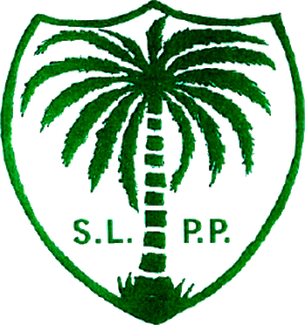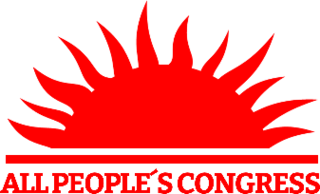
Sierra Leone, officially the Republic of Sierra Leone, is a country on the southwest coast of West Africa. It shares its southeastern border with Liberia, and the northern half of the nation is surrounded by Guinea. Covering a total area of 71,740 km2 (27,699 sq mi), Sierra Leone has a tropical climate, with diverse environments ranging from savanna to rainforests. The country has a population of 7,092,113 as of the 2015 census. Freetown is the capital and largest city. The country is divided into five administrative regions, which are subdivided into 16 districts.
Sierra Leone first became inhabited by indigenous African peoples at least 2,500 years ago. The Limba were the first tribe known to inhabit Sierra Leone. The dense tropical rainforest partially isolated the region from other West African cultures, and it became a refuge for peoples escaping violence and jihads. Sierra Leone was named by Portuguese explorer Pedro de Sintra, who mapped the region in 1462. The Freetown estuary provided a good natural harbour for ships to shelter and replenish drinking water, and gained more international attention as coastal and trans-Atlantic trade supplanted trans-Saharan trade.

The Sierra Leone People's Party (SLPP) is one of the two major political parties in Sierra Leone, along with its main political rival the All People's Congress (APC). It has been the ruling party in Sierra Leone since 4 April 2018. The SLPP dominated Sierra Leone's politics from its foundation in 1951 to 1967, when it lost the 1967 parliamentary election to the APC, led by Siaka Stevens. Originally a centre-right, conservative party, it identifies since 2012 as a centre-left social democratic party, with a centrist tendency.

Siaka Probyn Stevens was the leader of Sierra Leone from 1967 to 1985, serving as Prime Minister from 1967 to 1971 and as President from 1971 to 1985. Stevens' leadership was often characterized by patrimonial rule and self-indulgence, consolidating power by means of corruption and exploitation.

The All People's Congress (APC) is one of the two major political parties in Sierra Leone, the other being its main political rival the Sierra Leone People's Party (SLPP). The APC has been the main opposition party in Sierra Leone since 4 April 2018 when Julius Maada Bio of the SLPP won the 2018 presidential elections, though it maintains a majority in parliament.

Makeni is the largest city in the Northern Province of Sierra Leone. The city is the capital of Bombali District, and is the economic center of the Northern Province. Makeni is the fifth largest city in Sierra Leone by population. The city of Makeni had a population of 80,840 in the 2004 census and a 2013 estimate of 112,428. Makeni lies approximately 110 miles east of Freetown. Makeni is home to the University of Makeni, the largest private university in Sierra Leone. As with most parts of Sierra Leone, the Krio language of the Sierra Leone Creole people is the most widely spoken language in Makeni.

Ernest Bai Koroma is a Sierra Leonean politician who served as the fourth President of Sierra Leone from 17 September 2007 to 4 April 2018.

The Limba people are an ethnic group in Sierra Leone. They represent 12.4% of the total population, making them the third largest ethnic group in Sierra Leone. The Limba are based in the north of the country across seven provinces, but are predominantly found in the Northern Province of Sierra Leone.

Sorie Ibrahim Koroma commonly known as S.I. Koroma was a Sierra Leonean politician, labor activist, and one of the founding members of the All People's Congress political party. He served as first Vice President of Sierra Leone from April 19, 1971, to retirement on November 28, 1985, under president Siaka Stevens.
Francis Misheck Minah was a Sierra Leonean statesman, lawyer and politician who served as First Vice President of Sierra Leone from 1985 to 1987 under President Siaka Stevens. An ethnic Mende from the Pujehun District, he became a member of the House of Representatives in 1967. He had previously served as Minister of Foreign Affairs, Minister of Health, Minister of Trade and Industry and Attorney General and Minister of Justice.

Dr Samura Mathew Wilson Kamara is a Sierra Leonean politician and economist. He was the All Peoples Congress (APC) Party's candidate for President of Sierra Leone in the 2018 election. He was the Minister of Foreign Affairs and International Cooperation of Sierra Leone from 2012 to 2017, Minister of Finance and Economic Development from 2009 to 2013, Governor of the Bank of Sierra Leone from 2007 to 2009, Financial Secretary in the Ministry of Finance during President Ahmad Tejan Kabbah's administration.
Mandinka people of Sierra Leone is a major ethnic group in Sierra Leone and a branch of the Mandinka people of West Africa. Most Sierra Leonean Mandingo are the direct descendants of Mandinka settlers from Guinea, who settled in the north and eastern part of Sierra Leone, beginning in the late 1870s to the 1890s under the rule of prominent Mandinka Muslim cleric Samori Ture. Also later a significantly large population of Mandinka from Guinea migrated and settled in Eastern Sierra Leone and Northern Sierra Leone in the early to mid 20th century. The Mandingo people of Sierra Leone have a very close friendly and allied relationship with their neighbors the Mandingo people of Guinea and Liberia, as they share pretty much identical dialect of the Mandingo language, tradition, culture and food.

In April 1961, Sierra Leone became politically independent of Great Britain. It retained a parliamentary system of government and was a member of the British Commonwealth of Nations. The Sierra Leone People's Party (SLPP), led by Sir Milton Margai were victorious in the first general election under universal adult franchise in May 1962. Upon Sir Milton's death in 1964, his half-brother, Sir Albert Margai, succeeded him as Prime Minister. Sir Albert attempted to establish a one-party state had the ready cooperation of the opposition All People' Congress but met fierce resistance from some cadre within his party Sierra Leone People's Party (SLPP) and ultimately abandoned the idea.

Alhaji Usman Boie Kamara is a Sierra Leonean politician, businessman and mining engineer who has been Minister of Trade and Industry of Sierra Leone since 2013. He previously worked as director of the Sierra Leone National Diamond Mining Company (NDMC).
Kaifala Marah is a Sierra Leonean politician, accountant, Governor of the Bank of Sierra Leone (2016–2017), and Minister of Finance (2013–2016). On 7 March 2017, Dr. Marah resigned as governor to seek the nomination of the All People's Congress (APC) for the presidential election of 2018.
T.I Ahmadiyya Secondary School is a secondary school in Freetown, Sierra Leone. In the country, the school is known for its academic output and for its production of sportsmen and women. It is one of the 55 Ahmadiyya secondary schools in the country.

Sierra Leone Ministry of Finance is a ministerial department of the Government of Sierra Leone, and is in charge of managing the revenue and finances of the Sierra Leone government. The ministry implements the economic policies and is responsible for public financial management. The ministry advises the President of Sierra Leone on economic issues. The headquarters of the Sierra Leone Ministry Of Finance is located on George Street in Freetown, Sierra Leone.
The Order of the Rokel is the second order of Sierra Leone, after the Order of the Republic. It may be awarded to recognize Sierra Leoneans who have distinguished themselves by making valuable contributions to the country in the areas of to the public service, arts and sciences, and philanthropy. The award is normally awarded by the President of Sierra Leone.
The Presidential Award is a decoration established by President Siaka Stevens to honour Sierra Leoneans in recognition of "diligent and dedicated services" to Sierra Leone.











